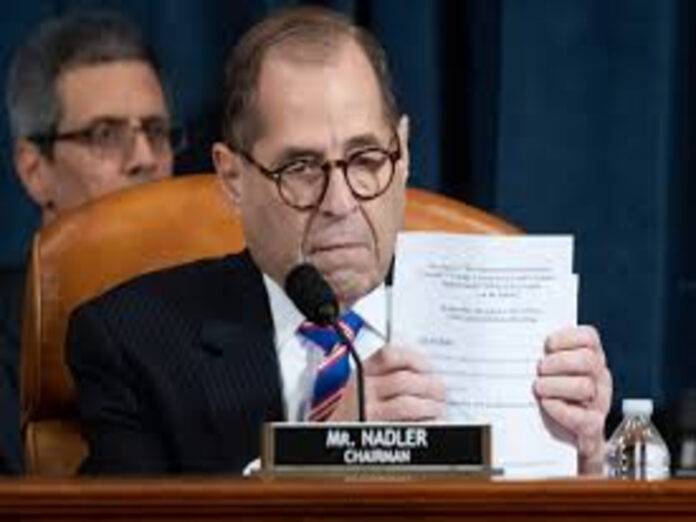Jerry Nadler’s Retirement: The Long-Awaited End of an Ineffective Career
Saturday, September 6, 2025, 9:45 A.M. ET. 4 Minute Read, Opinion, By Jennifer Hodges: Englebrook Independent News,
MANHATTAN, NY.- Rep. Jerry Nadler, the longtime Democratic congressman from New York, announced he will not seek re-election in 2026. After more than three decades in office, Nadler’s exit is being sold as an act of humility, a recognition of the need for “generational change.” In truth, his retirement is less a noble gesture than an overdue acknowledgment of a career defined by missed opportunities, political inertia, and misplaced priorities.
For years, Nadler has been celebrated in Manhattan’s liberal circles as a stalwart defender of progressive causes. He chaired the House Judiciary Committee, oversaw Donald Trump’s impeachments, and touted his record on civil rights. But beneath the headlines and the occasional grandstanding hearing, Nadler leaves Congress with remarkably little lasting legislative achievement. His tenure is a case study in the dangers of confusing seniority with effectiveness.
Oversight Without Outcomes;
Nadler’s most high-profile role came during the impeachment trials of Donald Trump. As Judiciary Chair, he presided over hearings that captivated cable news but achieved little tangible results. The impeachments failed to remove Trump, and Nadler’s insistence on conducting marathon hearings that descended into political theater did little but deepen partisan divisions.
His critics in Washington have long complained that Nadler mistook visibility for effectiveness. He relished the spotlight but proved unable to translate investigations into enduring reforms. Where were the systemic guardrails against executive abuse? Where were the bipartisan coalitions to protect democratic norms? Nadler left those fights unfinished.
A Record of Legislative Stagnation;
Beyond impeachment, Nadler’s legislative record is paper-thin for a man who spent over 30 years in Congress. Yes, he introduced bills on voting rights, immigration, and gun safety—but year after year, they languished without meaningful progress. While some blame Republican obstruction, the truth is that effective lawmakers find ways to build coalitions, cut deals, and get things passed. Nadler rarely did.
New York’s infrastructure woes tell the same story. He often touted his advocacy for projects like the Gateway Tunnel, Penn Station redevelopment, and subway modernization. Yet these initiatives remain mired in delays, half-completions, or endless planning stages. Manhattan commuters today face the same crumbling transit system they did when Nadler entered Congress. For all his seniority, Nadler delivered little tangible improvement.
Generational Drift;
Nadler is retiring at 77, but he should have stepped aside long ago. His brand of politics—committee-room liberalism heavy on rhetoric but light on results—has long since lost touch with the city he represented. Younger, more energetic Democrats are now challenging entrenched incumbents precisely because Nadler’s style of leadership feels stale, reactive, and uninspired.
In an era of surging housing costs, climate threats, and rising urban crime, Nadler offered recycled talking points and endless oversight hearings. The problems of 2025 are not the problems of 1995, yet Nadler seemed incapable of adapting. His retirement may be the first meaningful contribution he has made to generational renewal in decades.
Missteps and Misjudgments;
Even Nadler’s judgment often fell short. In 2020, he wrongly claimed Kyle Rittenhouse had transported a firearm across state lines—an easily fact-checked error that revealed a disturbing carelessness from a senior lawmaker. He repeatedly framed issues in the most partisan terms, cementing his reputation as a divider rather than a problem-solver.
Meanwhile, his district’s pressing issues—affordable housing shortages, public safety concerns, and infrastructure failures—rarely topped his agenda. Manhattan residents needed a fighter for pragmatic solutions; they got a congressman more interested in Beltway showdowns than neighborhood realities.
A Legacy of Complacency;
Nadler’s defenders will point to his role in securing post-9/11 recovery funds and his support for LGBTQ rights. These are real achievements—but isolated ones. Over the course of three decades, they hardly justify the unearned deference he enjoyed within Democratic circles. His long incumbency was secured not by results but by the safe insulation of a deep-blue district. Nadler never faced severe electoral pressure, and it showed.
The truth is that Nadler’s career is less a story of progress than of complacency. He became a fixture of Washington, content to hold hearings, issue statements, and bask in seniority while failing to deliver the structural reforms his district and country desperately needed.
The End of an Era—For the Better;
Jerry Nadler’s retirement is long overdue. His departure should serve as a warning to other entrenched incumbents who confuse longevity with leadership. The Democratic Party cannot afford another generation of lawmakers who waste their clout on empty spectacle while neglecting the real work of governing.
For Manhattan, Nadler’s exit is an opportunity to elect someone with energy, vision, and urgency. For Congress, it serves as a reminder that tenure is not synonymous with effectiveness. And for Nadler himself, it is the end of a career that, despite all the headlines, will be remembered more for what it failed to achieve than for what it accomplished.

